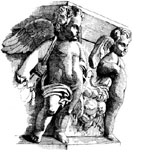
The Fifth Last Word
'I THIRST'
Isaac Jogues thirsted for souls. In 1636 the young French Jesuit met several missionaries recently returned from New France, which encompassed much of what is now Canada and the northern United States. The men described New France — and its native inhabitants — as harsh and often unwelcoming. Their stories didn’t deter Jogues; rather, they inspired him to journey thousands of miles to serve and convert the native peoples. That same year he embarked to New France, where he was assigned as a missionary to the Huron and Algonquian, both of whom were allies of the French.
Six years after his arrival, Jogues, lay Jesuit missionary René Goupil, and several Huron were returning from Quebec City laden with supplies when they were ambushed by Iroquois warriors. Over the next several months, the Iroquois subjected Jogues and Goupil to a variety of tortures, including tearing off their hair, beards, and nails, and biting through their forefingers. They eventually tomahawked Goupil to death. While in captivity, Jogues continued to perform his priestly ministry, baptizing and hearing the confessions of other prisoners.
In 1643, after a year in slavery, Jogues escaped with the help of Dutch settlers, who put him on a ship back to France. In Europe, Pope Urban VIII proclaimed Jogues a “living martyr” and gave him a dispensation to say Mass with his mutilated hand. Yet, the following year, Jogues was back in New France, where he volunteered to serve as an emissary to the Mohawk. The tribe was suffering an outbreak of infectious disease and crop failure, which they blamed on the Jesuits. In October 1646 they invited Jogues to a meal, where they tomahawked him to death, placed his severed head on a pole, and threw his dismembered body into the Mohawk River.
You May Also Enjoy
The three major newsweekly magazines featured Jesus for Easter week. It’s puzzling that these distinguished…
The robust friendship of 20th-century Swiss theologians Karl Barth and Hans Urs von Balthasar offers a different approach to ecumenical dialogue.
A wise and ancient scholar named Waniphallis (d. 666) once remarked to his Latin colleagues…

